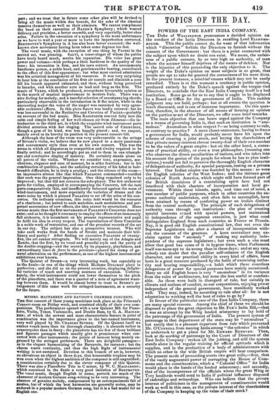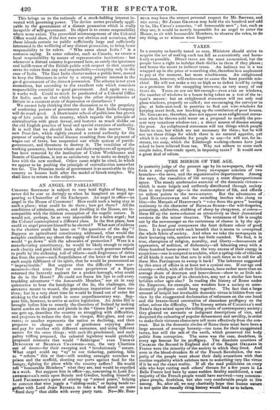TOPICS OF THE DAY.
POWERS OF THE EAST INDIA COMPANY.
THE Duke of 'WELLncorow pronounces a decided opinion on the conduct of the India Directors in recalling Lord ELLENBO.
EoucH. This the public cannot do, for want of that information which " discretion ' forbids the Directors to furnish without the
consent of the Government : but there is a point connected with
the subject upon which no doubt can exist. We mean, the unfair- ness of a public censure, by so very high an authority, of men whom the accuser himself deprives of the means of defence. Nor is the injustice of this proceeding the only objection to it. The weight of the Duke's opinion on most subjects is so great, that
people are apt to take for granted the correctness of his mere dicta. In the present instance, a mischief ensues which may not be easily remedied. There is at this moment a tendency in public opinion, produced entirely by the Duke's speech against the tongue-tied Directors, to conclude that the East India Company itself is a bad institution. Some go so far as to say that it ought to be displaced
by a Board or Office for the government of India. This sudden judgment may not hold, perhaps ; but at all events the question is much discussed, and is one of immense importance. On this ques- tion, therefore, in the absence of all means of forming an opinion on the particu ar act of the Directors, we offer some brief remarks. The main objection that one hears urged against the Company as a means of governing India is, that such an institution is "ano- malous." Anomalous in what respect ?—as being contrary to rule, or contrary to practice ? A mere closet-statesman, having to frame a government for India, would probably never have hit upon the scheme of creating a joint stock, and letting the shareholders of that private money-interest choose twenty-four of their own number to be the rulers of a great empire : but on the other hand, a states- man of practical ability, or even a true philosopher, (meaning one who observes the divers peculiarities of nations, and who takes into his account the genius of the people for whom he has to plan insti- tutions,) would not fail to perceive the thoroughly English character of delegations of authority, for special purposes, resting on a private interest. Our Indian empire was founded by this means : so were the English colonies of the West Indies; and the thirteen great colonies of North America, which might still have formed part of the British dominions if a centralizing spirit here had not interfered with their charters of incorporation and local go- vernment. Within these islands, again, and time out of mind, a vast number of public purposes, which in other countries the su- preme authority undertakes, and often fails to accomplish, have been attained by means of conferring power on bodies distinct from the central authority. The principle of such delegations of authority runs through our institutions : the plan of creating special interests armed with special powers, and maintained in independence of the supreme executive, is just what most distinguishes England from such countries as France or Prussia. Nay, it is good old English constitutional law, that not even the Supreme Legislature can alter a charter of incorporation with- out the consent of the grantees. A keen centralizer may ex- claim against the " anomaly " of making any authority inde- pendent of the supreme legislature ; but even such a one must allow that good has come of it in by gone times, when Parliament itself was more apt to do wrong than in these days ; and at any rate, nobody can doubt that the peculiar self-reliance of the English character, and our practical ability in every kind of affairs, have been in a great measure produced by the habit of exercising autho- rity and bearing responsibility,—a habit which these countless delegations of power for special purposes have mainly occasioned. Many an old English house is very " anomalous" in its variance from the rules of architecture, but none the less useful or comfort- able. As these were built in disregard of rule, but suitably to climate and notions of comfort, so our corporations, enjoying power independent of the general government, have manifestly worked well. They may, indeed, be according to rule after all: for is not adaptation to working well the best of rules to go by ? In favour of the particular case of the East India Company, there are many special reasons. Among the chief of these we should be disposed to place the great objection to Mr. Fox's India Bill,—that it was an attempt by the Whig landed aristocracy to lay hold of the patronage of the government of India. The present system of patronage in that department of the state may be " anomalous "; but surely that is a pleasant departure from rule which prevented Mr. O'CONNELL from naming India among " the colonies" in which be undertook to get a place for Mr. EDWARD RUTHVEN. Then, look at the working of patronage by the Court of Directors of the East India Company : reckon all the jobbing, and still the system stands alone in the regular training for official aptitude which it supplies, and in the production of a body of administrators with which no other in the wide British empire will bear comparison. The present mode of proceeding averts two great evils,—first, that of the vastly augmented power of corrupting the House of Com- mons and the constituencies, which a " Colonial Office " for India would place in the hands of the landed aristocracy; and secondly, that of the incompetence of the officials whom the great Whig or Tory landlords would send to India if political influence disposed of cadetships and writerships. Who can believe that the private interest of politicians in the management of constituencies would work as well in this case, as the private interest of the shareholder. of the Company in keeping up the value of their stock ?
This brings us to the rationale of a stock-holding interest in- vested with governing power. The device seems peculiarly appli- cable to the government of a distant possession which is really incapable of self-government. Its object is to create responsibility where none exists. The proverbial mismanagement of the Colonial Office would show, if the fact were not obvious and notorious, that these islands contain no public sufficiently large and sufficiently interested in the wellbeing of any distant possession, to bring home responsibility to its rulers. " Who cares about India ? " is a common saying. In some colonies, such as Canada, we create a local responsibility by means of representative institutions : but whenever a distant country is governed here, so surely the ignorance and indifference of the British public with respect to that country saves its rulers from any real responsibility—excepting only in the case of India. The East India charter makes a public here, moved to keep the Directors in order by a strong private interest in the good government of the distant possession. The scheme is not even anomalous, but according to the excellent rule which considers responsibility essential to good government. And again we say, it works well. Could as much be predicated of a Colonial Office for India, such as that which keeps the other dependencies of Britain in a constant state of depression or disturbance ?
We cannot help thinking that the discussion as to the propriety of conferring powers of government on the East India Company will do much good. A Doctrinaire school of politicians has grown up of late years in this country, which regards the principle of centralization with great favour, and bestows as much dislike on the old English practice of local and special exercises of authority. It is well that we should look about us in this matter. The new Poor-law, which rightly created a central authority for the purpose of curing the social disease resulting from the payment of wages out of taxes, has suspended our whole system of parish- government, and threatens to destroy it. The condition of the working peasantry, between whom and their employers all sympathy has been removed by the institution of Union Workhouses and Boards of Guardians, is not so satisfactory as to make us deeply in love with the new method. Other cases might be cited, in which we appear to be pushing the principle of centralization somewhat too far. The Prussian mode of government is as unsuitable to this country as houses built after the model of Greek temples. We shall have to return to the subject.



























 Previous page
Previous page